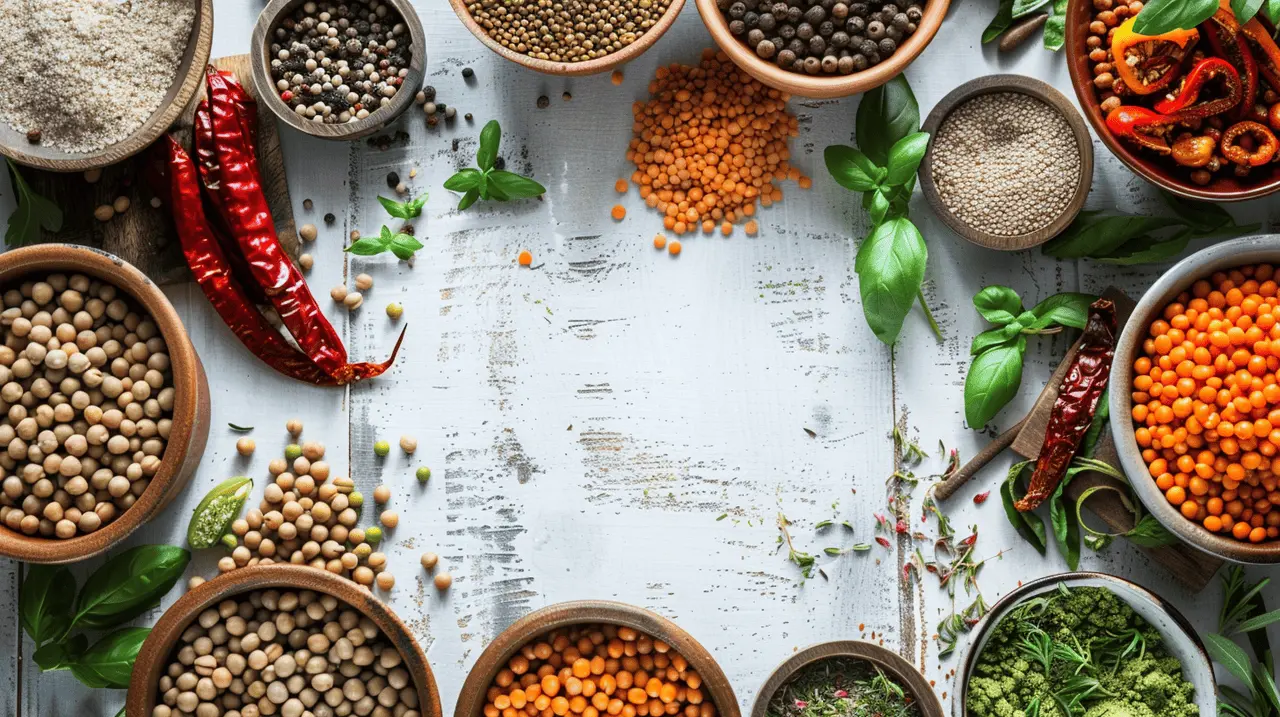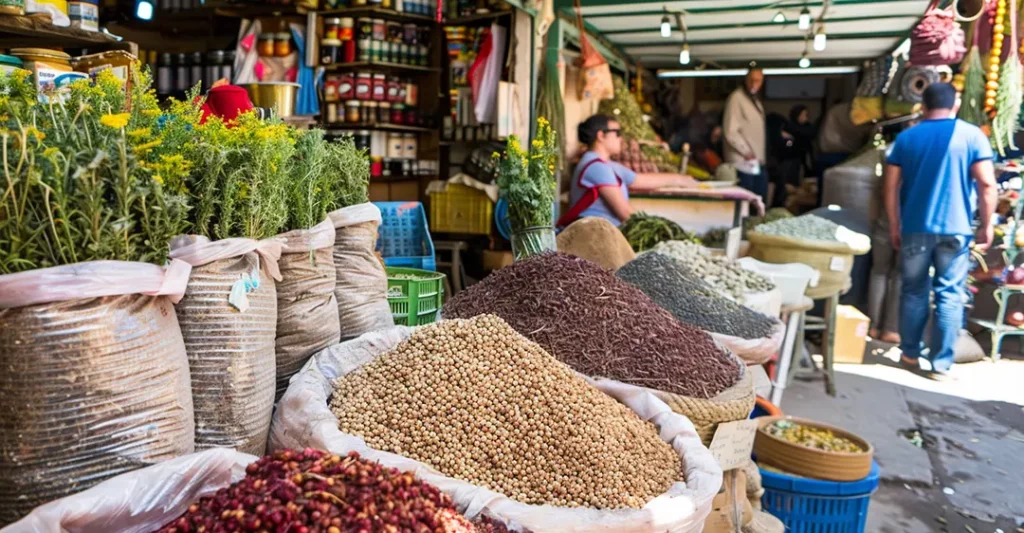
Pulses, like beans and chickpeas, are versatile and packed with nutrients like protein and fiber. Adding them to your diet can help manage weight and blood sugar levels while providing essential vitamins and minerals. Explore Mediterranean dishes with pulses for a delicious and sustainable way to eat healthier.
Pulses, a subcategory of legumes, include beans, lentils, peas, and chickpeas. These nutrient-dense foods are known for being high in plant-based protein, dietary fiber, vitamins, and minerals like iron, zinc, folate, and magnesium. They are low in fat and have a low glycemic index, making them great for managing blood sugar levels and weight.
In this article, we will explore:
By the end of this article, you’ll understand why pulses are not only nutritious but also sustainable for a healthier diet.
Pulses are a significant part of Mediterranean cuisine, known for their versatility and nutritional benefits. They are used in a variety of dishes, from salads to stews. Here are a few more types of pulses commonly found in Mediterranean cooking:
Cannellini Beans: These white beans are creamy and mild in flavour, often used in soups and stews. They are a staple in many Italian dishes, providing a smooth texture that blends well with other ingredients.
Chickpeas: These round and slightly nutty legumes are incredibly versatile. They can be used in salads, curries, and even ground into flour for baking.
Lentils: Available in various colours such as green, red, and brown, lentils cook quickly and are perfect for soups, stews, and salads. Each type has its own unique texture and flavour.
Kidney Beans: Known for their deep red colour and robust taste, kidney beans are a staple in chilli recipes and hearty stews.
Fava Beans: Also known as broad beans, fava beans have a creamy texture and a slightly sweet, nutty flavour. They are often used in dishes like falafel or simply sautéed with olive oil and herbs.
Black Beans: These beans are small, shiny, and black, with a slightly sweet flavour. They are commonly used in Spanish and Latin American cuisines, but they also feature in some Mediterranean dishes like black bean hummus.
These pulses not only enhance the flavour and texture of dishes but also provide essential nutrients, making them a healthy addition to any meal.
Pulses are renowned for their impressive nutritional profile:
By integrating pulses into your diet, you not only enhance your nutritional intake but also support sustainable eating practices that benefit both your health and the environment.
Pulses come in two main forms: dried and tinned. Each has its own set of advantages.
By understanding the types of pulses available, their nutritional benefits, and versatile cooking methods, you can easily start incorporating these powerhouse legumes into your daily meals.
Regular consumption of pulses can significantly contribute to heart health. One of the standout benefits is their ability to lower LDL (low-density lipoprotein) cholesterol levels, often referred to as “bad” cholesterol. Elevated LDL cholesterol levels are a risk factor for coronary artery disease, and incorporating pulses into your diet can help mitigate this risk.
Pulses also play a pivotal role in managing Type 2 diabetes due to their low glycemic index (GI). Foods with a low GI release glucose more slowly and steadily, which is crucial for maintaining stable blood sugar levels.
The high dietary fibre content found in pulses makes them beneficial for digestive health. Fibre plays a crucial role in maintaining regular bowel movements and preventing constipation.
For those aiming to manage or reduce their weight, pulses can be incredibly effective due to their ability to promote feelings of fullness.
Pulses are rich in phytochemicals like polyphenols, which have potent antioxidant properties. These compounds help neutralise free radicals in the body, reducing oxidative stress and inflammation.
Incorporating more pulses into your diet offers numerous health benefits that extend beyond basic nutrition. Their roles in heart health, diabetes management, digestive health, weight management, and providing antioxidant properties make them a powerhouse addition to any meal plan.

The Mediterranean diet, renowned for its health benefits, heavily emphasizes the consumption of pulses. This dietary pattern has been linked to a reduced risk of heart disease, stroke, and certain cancers. Pulses are not only rich in essential nutrients, but they also promote satiety and help maintain a healthy weight. By incorporating more pulses into your meals, you can reap these benefits and contribute to your overall well-being.
By integrating these simple yet effective methods into your daily meals, you can fully embrace the nutritional advantages that pulses offer within the Mediterranean diet framework.
Interesting Fact: The traditional Greek dish “Fasolada” is a bean soup considered one of the national dishes of Greece, showcasing how integral pulses are to Mediterranean cuisine.
Incorporating more pulses into your diet can significantly enhance your health while allowing you to enjoy diverse and flavourful meals reflective of the rich culinary heritage of the Mediterranean region.
Choosing pulses over animal protein sources has significant environmental benefits. Pulses require less land and water to grow compared to livestock farming. For instance, producing one kilogramme of pulses needs only a fraction of the water and space used for the same amount of beef or lamb.
Additionally, pulses contribute to reduced greenhouse gas emissions. Livestock farming is one of the largest producers of methane, a potent greenhouse gas. In contrast, pulses can actually improve soil health through nitrogen fixation, reducing the need for synthetic fertilisers which are major contributors to environmental pollution.
By incorporating more pulses into your diet, you can align your personal health goals with environmental consciousness. This means that not only are you benefiting from their nutritional value, but you are also making sustainable food choices that support the planet.
Here are some specific ways in which pulses are more sustainable than animal agriculture:
Making these small changes in your diet can have a profound impact on both your health and our environment.
Pulses are incredibly versatile and can be used in a variety of dishes that are not only nutritious but also delicious. Here are some mouth-watering recipes showcasing the adaptability of pulses:
Combine chickpeas with tomatoes, spinach, and a blend of spices for a warming, protein-packed stew.
A simple yet satisfying lentil soup with carrots, onions, celery, and a touch of garlic makes for a perfect meal on a chilly day.
Mix black beans with corn, bell peppers, red onions, and lime juice for a refreshing and vibrant salad.
Create a comforting bowl of split pea soup with ham hock or smoked turkey for added flavour.
Blend chickpeas with herbs and spices to form patties or balls that can be baked or fried. Serve in pita bread with fresh vegetables and tahini sauce.
For those seeking more culinary inspiration with pulses, check out these resources:
Experimenting with these recipes not only adds variety to your meals but also ensures you reap the numerous health benefits that pulses offer.
Pulses are incredibly nutritious. These small legumes are packed with plant-based protein, dietary fiber, vitamins, and essential minerals. Adding pulses to your meals not only increases the nutrients you get from your diet but also supports your overall health.
Here are some key benefits of pulses:
Pulses also have a positive impact on the environment. Compared to animal protein sources, they have a smaller carbon footprint, making them a great choice for those who care about sustainability.
Adding more pulses to your diet is an easy and effective way to improve your nutrition while also supporting the planet. Whether you enjoy them in soups, salads, or stews, these versatile legumes are a tasty addition to any meal plan. Start incorporating pulses into your meals and experience the benefits for yourself!

At Med.kitchen, our passion lies in crafting exceptional culinary experiences through our online platform. We specialise in sharing a wealth of knowledge via articles, recipes, courses, and online mentoring, aiming to inspire both novice and seasoned chefs alike. Our focus has shifted from private dining to being an online source of gastronomic inspiration, allowing you to explore and refine your culinary skills from the comfort of your home..